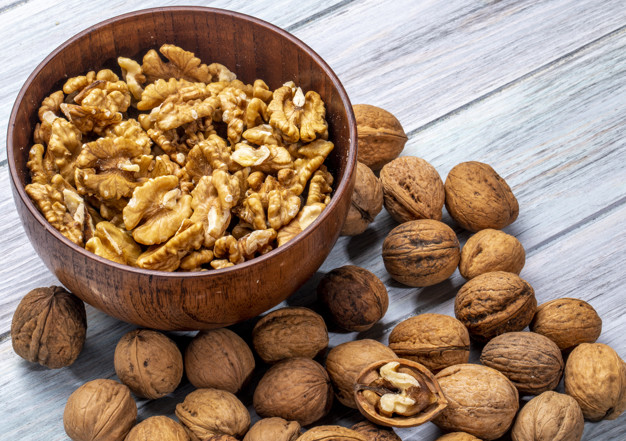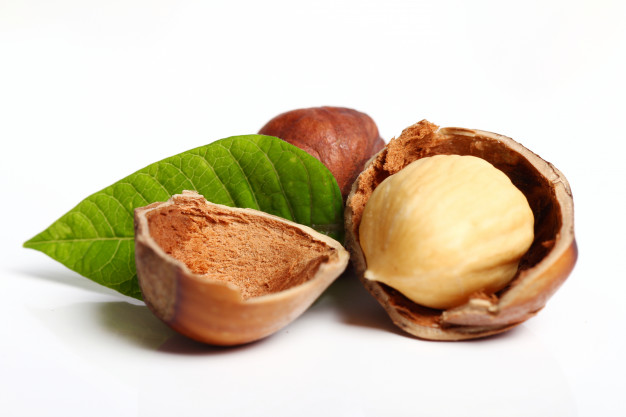Walnut is known as brain food as its consumption significantly improves brain functions. It is extremely tasty and contains several imperative nutrients that offer numerous health benefits.
Nutritional profile
- It contains lesser amount of carbohydrate
- It contains dietary fibre as well
- It is composed of various important amino acids
- It contains healthy fat. It is rich in unsaturated fatty acid and especially loaded with omega 3 fatty acid but it is absolutely cholesterol free
- It provides desirable amount of calories on its oxidation as it contains significant amount of fat
- It contains several vitamins like Vitamin A, Vitamin C, Vitamin E, Vitamin B1, B2, B3, B6, B7 and B9
- It is also loaded with various important trace elements, which include calcium, phosphorus, iron, copper, manganese and magnesium
- It contains several phytonutrients too that exert potent nutraceutical activities
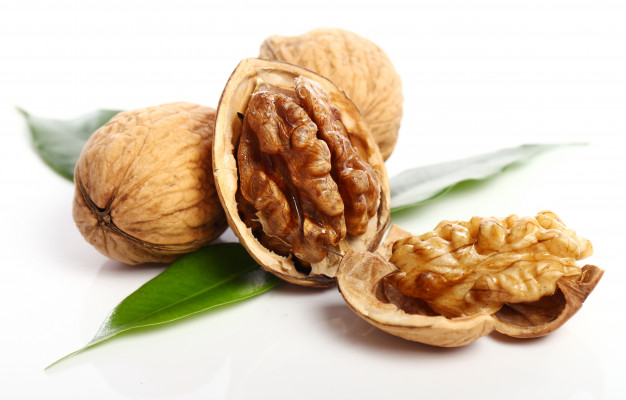
Biological activity
Antioxidant activity
- Walnut is packed with melatonin, Vitamin E and polyphenolic components, which exert potent antioxidant activity
- It helps to decrease the concentration of free radicals and reactive oxygen species in body
- It also helps to prevent lipid peroxidation
- Its consumption is very much beneficial for reducing the susceptibility of developing chronic diseases as it helps to decrease oxidative stress

Anti-inflammatory activity
Its polyphenolic components especially ellagitannins exhibit anti-inflammatory activity thus its consumption is thought to be extremely beneficial for reducing inflammation, swelling and pain
Anti-carcinogenic activity
- Its polyphenolic components, unsaturated fatty acid contents and antioxidant activities play imperative role in reducing the prevalence of carcinoma
- Consumption of walnut significantly reduces the risk of developing prostate, breast, pancreatic and colorectal cancers
Health benefits
Role on nervous system
- Walnut contains several imperative nutrients that help to promote the health of nervous system
- Its unsaturated fatty acid content especially omega 3 fatty acid content plays vital role in improving brain’s activity
- On the other hand its B vitamin components especially Vitamin B6 helps in promoting the growth and development of brain too
- It has seen that individual who consume walnut have better brain functions than others like they have relatively faster processing speed and they have more mental flexibility
- It also helps to improve memory and cognition
Role on skeletal health
- Consumption of walnut is considered as an effective measure for maintaining a healthy skeletal system
- Its calcium and phosphorus components play imperative role in healthy bone formation
- It helps to increase bone mineral density. Copper is another important component found in walnut, which also helps in increasing bone mass and density thus its consumption is thought to be extremely helpful for improving the symptoms of osteoporosis
- It also helps to improve the strength of bone thus reduces the prevalence of fractures
- It is associated with repairing bone damages as it stimulates the synthesis of connective tissue
- Its magnesium component also plays vital role in healthy bone formation as it helps to enhance the absorption of calcium within bones
- It helps to improve joint functionality as well


Role on metabolism
- It plays imperative role in boosting up overall metabolism of body
- It helps to improve the energy level
- It is extremely useful for enhancing slow moving metabolism
Role on digestive health
- Its consumption is very much useful for preventing various digestive issues
- Its fibre content plays imperative role in preventing constipation. Fibre found in walnut also improves peristalsis as a result improves colonic health and decreases the susceptibility of developing diverticular disease
- It helps to promote the growth of intestinal beneficial microbes, which in turn produce butyrate that helps to nourish the gut hence improves overall gut health
- Its antioxidant and anti-inflammatory activities are also accountable for protecting the digestive tract from damages thus lessen the risk of developing ulcers, inflammatory bowel disease and irritable bowel syndrome

Role on reproductive health
- It has seen that consumption of walnut is extremely helpful for improving reproductive health especially male reproductive health
- It is associated with improving sperm quality
- It also helps to improve sperm shape, motility and vitality
- It helps to protect the sperm from oxidative damages hence improves its functionality, which ultimately promotes fertility
Role on maternal health
- Consumption of walnut during pregnancy is a good choice as it provides various nutrients, which are required during gestation for promoting the growth and development of fetus
- It is loaded with B vitamins that play vital role in supporting the enhanced metabolism of gestational period
- Its folate content is also responsible for preventing the prevalence of birth defects
Role on skin
- It contains various nutrients that help to nourish the skin
- It helps to protect the skin from oxidative damages thus helps in preventing ageing
- It helps to improve skin elasticity as well
- Individual with dry skin should consume walnut as it helps to moisturize the skin
- It is very effective for preventing wrinkles and dark circles under eyes

Role on hair
- It helps in improving hair growth
- Its Vitamin B7 content plays imperative role in preventing hair loss
- It is also associated with improving hair shine and strength
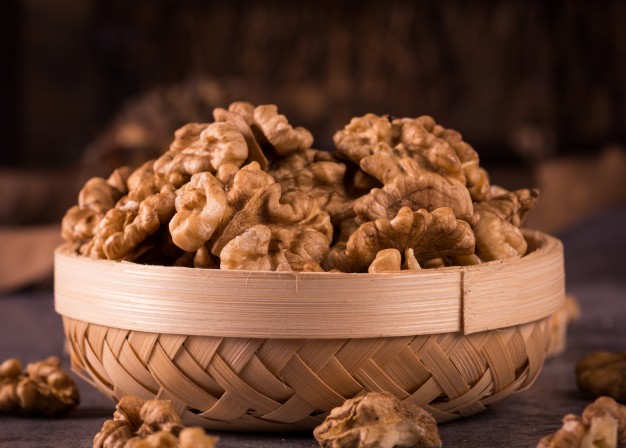
Therapeutic uses
Walnut has various therapeutic advantages, which include –
- It is very effective for decreasing blood sugar concentration thus individual with hyperglycemia should consume walnut for improving their symptoms. Its fibre content is responsible for reducing blood sugar level by decreasing glucose absorption from intestine. On the other hand it is also associated with regulating insulin resistance that also helps to stabilize blood sugar level
- Individual with hypercholesterolemia can include walnut in their diet as it helps in decreasing blood cholesterol concentration, especially the concentration of LDL
- It is also very effective for promoting cardiac health. Its cholesterol lowering activity decreases the prevalence of atherosclerosis as a result reduces the risk of developing coronary artery diseases. Its antioxidant activity helps to protect the heart from damages thus reduces the prevalence of strokes and heart attacks. Its magnesium component helps to maintain normal heart beat as well
- It helps to facilitate weight reduction too
- It also promotes hepatic health by inhibiting fat deposition within liver cells
- It significantly reduces the prevalence of gall stone
- It has seen that individual with epilepsy have poor magnesium level in their blood thus it is better to consume magnesium rich food for early recovery. As walnut helps to provide adequate amount of magnesium thus it is believed that consumption of walnut helps to improve the symptoms of epilepsy

Culinary uses
It can be consumed alone or can also be used for preparing various dishes, like –
- Chopped walnut can be used in scones and in whole grain breads
- It can be sprinkled on fruit salad or vegetables
- It can be crushed and used as coating on chicken or fish
- It can be finely ground and used in dips or sauces
- It can also be added on the top of oat meal and yogurt
- It can be used for preparing sandwiches, pastas, noodles etc
- It can be roasted as well and can be added to homemade trail mix
Risk factors
Excessive consumption of walnut it not wise as it may increase the risk of obesity and digestive issues. It may also cause allergic reaction.
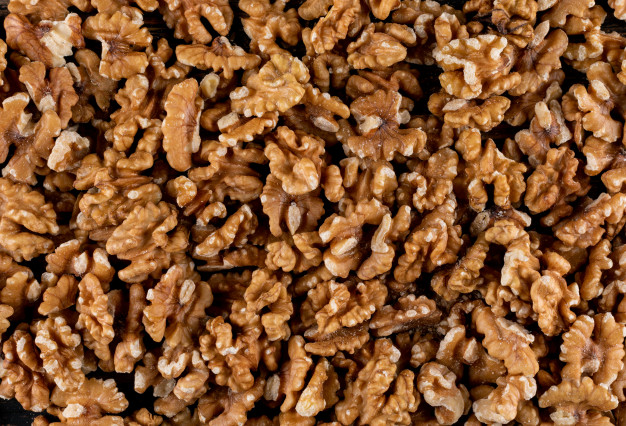

Source:
Fatima, T., Showkat, U. and Hussain, S.Z., 2018. Nutritional and health benefits of walnuts. Journal of Pharmacognosy and Phytochemistry, 7(2), p.1269.
Hayes, D., Angove, M.J., Tucci, J. and Dennis, C., 2016. Walnuts (Juglans regia) chemical composition and research in human health. Critical reviews in food science and nutrition, 56(8), pp.1231-1241.
Ros, E., Izquierdo-Pulido, M. and Sala-Vila, A., 2018. Beneficial effects of walnut consumption on human health: Role of micronutrients. Current Opinion in Clinical Nutrition & Metabolic Care, 21(6), pp.498-504.
Sánchez-González, C., Ciudad, C.J., Noe, V. and Izquierdo-Pulido, M., 2017. Health benefits of walnut polyphenols: An exploration beyond their lipid profile. Critical reviews in food science and nutrition, 57(16), pp.3373-3383.
Tapsell, L.C., 2009, February. Health benefits of walnut consumption. In VI International Walnut Symposium 861 (pp. 409-416).
Zibaeenezhad, M.J., Shamsnia, S.J. and Khorasani, M., 2005. Walnut consumption in hyperlipidemic patients. Angiology, 56(5), pp.581-583.
